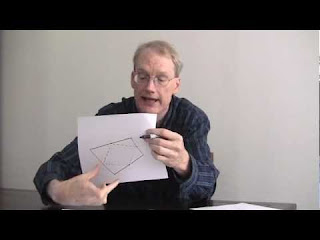 |
| Michael Paul Goldenberg |
Greetings, Summers-Knoll community members. My name is Michael Paul Goldenberg, and it is my pleasure and privilege to be teaching mathematics this year. I apologize for not being able to introduce myself to you sooner, but I only began at S-K a few weeks ago. This page will serve as my way of providing information to parents and students about what we're doing in mathematics. I will try to give frequent updates about what we are working on, how it's going, what you can have your student working on at home (particularly from Friday to Sunday, as I am at the school on Monday through Thursday). I will offer links to cool and intriguing mathematics articles, books, and resources as I run into them. Most of what I recommend will be free. I hope you'll find many of these things of sufficient interest that you may want to pursue them with your child yourself.
 |
| Paul Lockhart |
The first resource I want to recommend is an article that first appeared about six years ago and has subsequently been enlarged into a book (one I just finished reading about two weeks ago, though I'd read the article when Stanford mathematician and NPR's "The Math Guy," Keith Devlin, wrote about it in his column, "Devlin's Angle." The article (and the subsequent book) is called, "A Mathematician's Lament," and the author is Paul Lockhart, a professional university mathematician who chose to leave research mathematics to teach at St. Ann's, a highly-regarded private school in Brooklyn, NY. I cannot recommend this article/book too highly to you (the article is great, but the book goes further in making the case that what most of us were taught in K-12 has little if anything to do with mathematics, and the sad situation in which most Americans find themselves in relation to the subject is grounded in the fact that they've actually never seen real math, never seen or been asked to do actual mathematics, and instead have been given the wrong-headed notion that the subject comprises little but routine calculation/computation and the rote memorization, practice, and application of arcane definitions, terminology, notation, and algorithms in the service of finding a single numerical answer to problems (or, more accurately, exercises) the solutions to which are already well-known. Further, K-12 math teachers and undergraduate mathematics instructors give students the impression, at least through the completion of the calculus sequence, if students get that far, that the keys to being "good at math" are speed and accuracy. Thus, along the K-14 path, students drop out of mathematics as they realize that they're not speedy calculators and don't see the solution methods to various exercises as instantly as their instructors and their more "mathy" peers. By the end of the second year of college, the number of American students who are likely to pursue more mathematics or mathematics-based courses has dropped so dramatically that it borders on a national "crisis," (though I would argue that the nature of that crisis isn't quite what it's generally made out to be).
Please try to find the time to read the article or at least peruse it. As I'm not a professional mathematician (I have a masters degree from the University of Michigan in mathematics education), it's gratifying to find working mathematicians with whom I share similar views of what K-12 mathematics should look like and how far short of that most US instruction falls.
Later today, I will be posting pictures from the problems we worked on starting last Wednesday and concluding yesterday, as well as a summary of what those problems entailed. We turned to something new today that will continue tomorrow, and I will post photos from the activity as soon as I can. I'll try to keep things updated here regularly: every day or every other day if possible. Feel free to contact me if you have questions about any of the problems you see here or other mathematics issues: mikegold@umich.edu
It's been really invigorating and inspiring to work with S-K students and staff. I welcome the opportunity to help craft a mathematics program with them that will serve well the interests and natural curiosity of our students.
Warm regards,
Michael

No comments:
Post a Comment